Volunteering at Sambhavna
If you are interested in volunteering at the Sambhavna Clinic, we would love to hear from you. Volunteers contribute significantly to the running of the centre, and we can provide accommodation and food within the clinic for the duration of your stay. We ask that potential volunteers consider the ways in which they might contribute to the work taking place at the clinic, and stay for a minimum of two weeks.
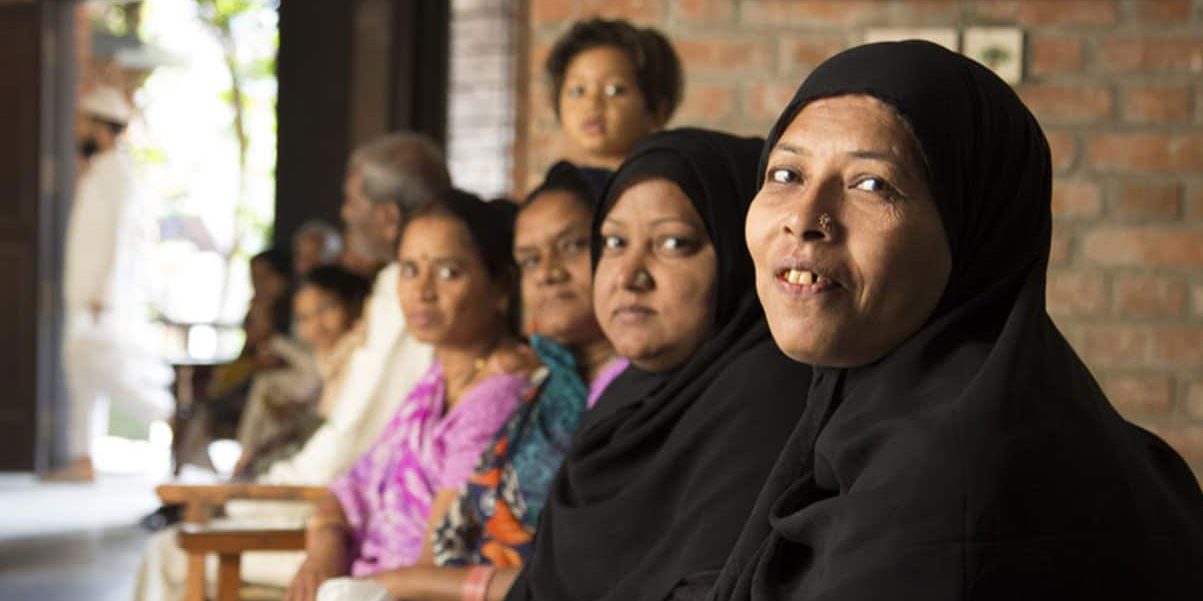
Volunteering at Sambhavna
The Chingari Trust was founded in 2006 when two Bhopal survivors, Rashida Bee and Champadevi Shukla, were recognized for their activism on behalf of the thousands of survivors of the Union Carbide Gas Disaster, and were presented with the Goldman Environmental Award.
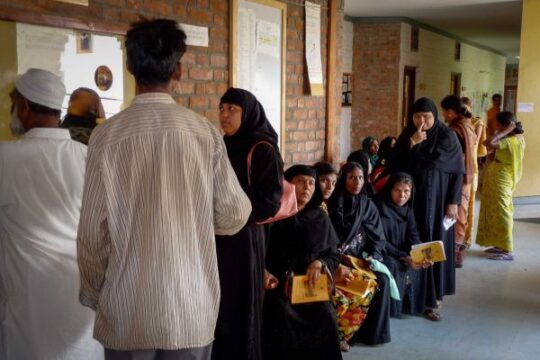 The continuing success of the Sambhavna Clinic not only depends on your donations but also on your involvement.
The continuing success of the Sambhavna Clinic not only depends on your donations but also on your involvement.
Sambhavna, and the Chingari Rehabilitation Centre, are the only places in Bhopal to offer anybody affected by the toxic gas of the 1984 disaster, or the subsequent water contamination crisis, the first-class healthcare they deserve free of charge.
Volunteers can contribute significantly to the work there and we encourage you to think of a project that would be both meaningful and enjoyable for you and helpful for Sambhavna. If you do have a project in mind, or have certain talents that you think may benefit the clinic, please tell let us know when you make your application. Research projects are also welcomed.
Since the clinic opened in September 1996, volunteers have contributed their skills, time and experience in areas such as medicinal care, medical and other research, advertising, publishing, interpreting, website building, production of materials (eg for health education), they have interviewed doctors in the city, made paintings of birds visiting the herbal garden, and even hauled manure!
You do not need specific professional experience as many tasks are worthwhile and valuable. The gardeners, for example, always welcome extra hands! Past volunteers will tell you that they have really enjoyed working on socially relevant issues and learned many different things. You can read about previous volunteers in the blog pages of this site.
Sambhavna offers a unique working experience for serious and committed volunteers. It is a cooperative and equal society in its own right and runs itself democratically in a spirit of collective working. A sensitive attitude for the complex issues of the Bhopal disaster and a preparedness to learn are essential for any prospective volunteer. Some knowledge of Hindi is useful but by no means necessary.
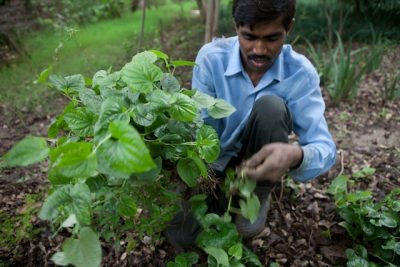 Essential Information
Essential Information
Volunteers need to stay for a minimum of two weeks in order to do something worthwhile. It can take two or three days to familiarise yourself and to make sense of the work going on at the clinic and within the communities. We accept volunteers who wish to stay for longer periods of time, such as six months to a year.
Food (vegetarian, 2 meals on most days) and accommodation within the clinic are provided but we are unable to cover any other costs. The accommodation is comfortable but modest and the food is in a simple, local Indian style.
There is one dormitory for men, one for women, and two guest rooms. The male dormitory sleeps up to six people and the female a few more. There are separate washroom facilities. The guest rooms can each sleep two and have en-suite facilities.
The dormitories are kept strictly gender separate. You are required to respect the common morality of India and not socialise in mixed genders in the dormitories. Couples who come to Sambhavna to volunteer together may be able to stay in a guest room, but we cannot guarantee availability.
All volunteers are asked to fill out an entrance survey upon arrival and an exit survey upon departure. These surveys are designed to help you reflect on your experiences and enable Sambhavna to keep records of who has volunteered and take in any suggestions for improvement of the volunteer program or areas of work. Depending upon your work, you may be requested to document or to write-up a paper of observations and/or explanations and any relevant results.
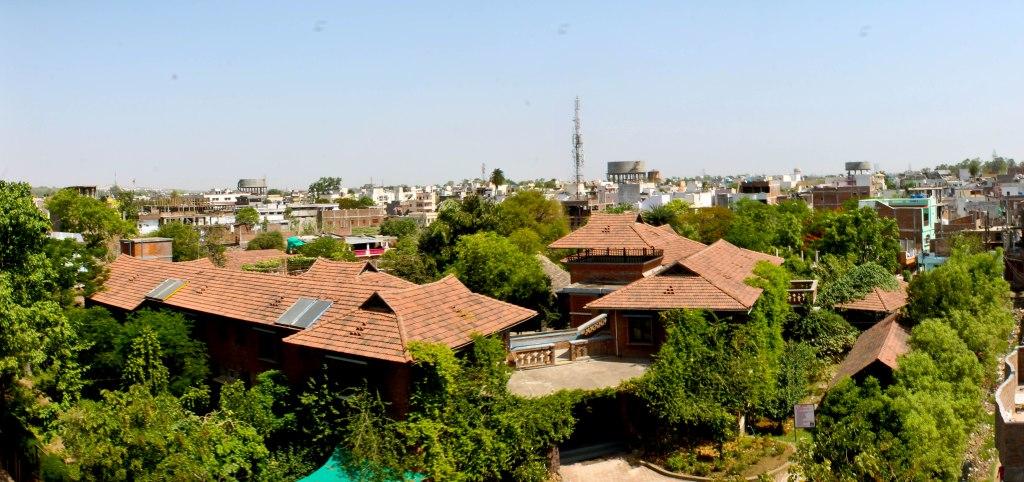
What to bring and what not to bring
More advice will be given if your application is successful. But, do bring your own laptop or tablet, mobile (cell) phone and a suitable plug adaptor or two, plus a small torch can be very useful especially if there should be a power cut. Please bring a sturdy, non-plastic water bottle or two.
Please ensure you only bring eco-friendly body and hair products and toothpaste. All of the grey water from Sambhavna’s bathrooms and kitchens is recycled and goes on to water the plants in the medicinal garden. It is imperative that we keep this water as absolutely free from chemicals as possible. At Sambhavna you will find certain hand-made eco-friendly products you are welcome to use free of charge. You’ll find basic soap for your body and hair, and for your laundry, and you’ll also find mosquito repelling sticks to burn.
Should you wish to bring your own mosquito repellent please bring those recommended by the Pesticide Action Network such as Herbal Armor, Buzz Away and Green Ban, each containing citronella and peppermint as well as various essential oils (cedar wood, lemongrass, etc.). If you use chemical repellents, such as DEET, these will wash off in the shower and will end up in the recycled water. You will find mosquito nets at Sambhavna, along with bedding, but do feel free to bring your own if you prefer.
Lastly, please be aware that Bhopal is a relatively old-fashioned and conservative city so please ensure you bring suitable clothes and dress appropriately at all times.
Just Visiting Bhopal?
Bhopal is not a tourist hub, but there are plenty of interesting things to see such as the Museum of Man and the Tribal Museum right next to the Van Vihar National park. There’s the Bharat Bhavan arts centre, the many lakes, and the fabulous mosques including the Taj Ul Masajid, reckoned by many to be India’s largest mosque. Just a few kilometres outside of Bhopal are two world heritage sites, with the Buddhist monuments at Sanchi, dating back to the 2nd century B.C. around 35KM north-east and the Bhimbetka rock shelters, which span the prehistoric paleolithic and mesolithic periods, around 35KM south-east.
If you are interested in visiting Sambhavna (or would like a group of your students to visit), please contact sambhavnabhopal@gmail.com. If you are UK-based, you’re also more than welcome to come and visit us here at the BMA office in Brighton. (See the contact page.)
Once Your Application is Accepted - Advice in Preparation for your Visit to the Sambhavna Trust Clinic
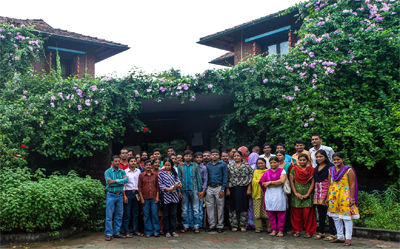
Thank you for volunteering your services and we look forward to welcoming you to our clinic. Because it is so important to the work of the clinic in the greater context of the Bhopal disaster it is important to understand and respect our founding principles. Please make sure that you can be in alignment with them before you come:
1. Individual responsibility and initiative.
2. Collective administration and democratic decisions.
3. Minimal footprint on the earth and its resources.
4. Considerate behaviour towards all other people and inhabitants.
5. Equality of all individuals – no matter what their job.
You probably have some questions now you are coming and we have attempted to answer the most common we get asked. If you have anything else you would like to know please get in touch again.
Getting To Sambhavna
Fly to Delhi or Mumbai: From there you can take a plane to Bhopal airport or a train to Bhopal Junction. There is a variety of express trains and one of the best sources for information is Seat61.com You can book train tickets via Cleartrip, as they accept credit/debit cards from non-Indian banks.
If you are coming from elsewhere in India, there are many travel routes to Bhopal.
From Bhopal airport: The best idea is to take a taxi and pay at the booth near the exit. Here the prices are standardised and you will be given a ‘ticket’ and directed to the driver. Give the same direction as below but you come from the opposite direction. It can be tricky for the taxi as the roads are more like tracks and very narrow close to the clinic. Occasionally one will not go all the way.
From Bhopal Junction Railway Station: Leaving from platform 5 side is best and you can get an auto-rickshaw from there. The road to Sambhavna is little more than a track in places so a taxi may not go there. Many rickshaw drivers do not know where Sambhavna is, even if they say they do, and it is not the easiest place to find first time. Ask for “Sambhavna aspataal” in “baafnaa colony” near “qazi camp” and “D I G bangla”, Tell the driver first to find Berasia Road and the Reliance petrol station they will all know where that is.
There is also the People’s Hospital as a landmark; the name is written in large letters in Hindi and English on the front. Tell the driver to take the road in between the hospital and the Reliance petrol station and then either keep asking at each junction or use the map at the end of this letter. (The scale is inaccurate.)
The usual fare for the journey is around 60 to 80 Rupees but many will ask you for much more and do expect to pay a little more. However don’t pay more than 100 unless it is an unforsaken hour of the morning and even then not much more.
On Arrival at the Clinic: If the clinic is open*, sign in and ask for the volunteer coordinator or any other name you have been given. If it is late or early the guard will show you to a room. You should be expected so there will be someone to welcome you. The guards are there all the time.
*The clinic is open Monday to Saturday, 08:30 to 15:00 approximately and it helps us if you can arrange to arrive between those times. If there are other volunteers then it may be possible to arrange for you to arrive at another time, including Sunday.
Sambhavna Contact Details
-
- Address: Sambhavna Trust Clinic, Bafna Colony, Berasia Road, Bhopal 462 001, Madyha Pradesh, India.
- Telephone: (in emergency only, please) +91 7552 730 914
Do bring a mobile phone with you but, if you want a local SIM, wait until you are in Bhopal. There is a good internet connection in the clinic.
Some Details About Life at Sambhavna
Water
In Sambhavna the drinking water is not contaminated by chemicals. In addition we use electronic filters to remove all bacteria and dirt. Waste water is fed onto the garden so please bring only environmental or ecological products for your washing etc. If in doubt, don’t bring it.
Health
Mosquitoes are a problem in Sambhavna so you are advised to take precautions against malaria. More generally, there are 5 doctors working here, including a gynaecologist so if you become ill you will be well cared for.
Food:
We provide all volunteers with free lunch and dinner six days a week, except on festival days or public holidays. On Sunday and holidays, only lunch is provided and you can cook in the volunteer kitchen at other times. Food is pure vegetarian in the local style. We are unable to cater specifically for any other diets.Breakfast: we don’t provide breakfast. The canteen serves breakfast generally between 08:30 and 10am for a few rupees. Chai is available throughout the day at the canteen for a few rupees. You will be asked to pay monthly (the canteen is contracted out). And, of course, you may make breakfast and drinks in the volunteer kitchen. Snacks etc are your own responsibility and you can make tea, coffee etc as often as you like. There is a four-ring gas stove, and a fridge/freezer. There are shops around the corner for milk, loose tea etc and a small mini-market about 20 minutes walk away for other things. There is a larger supermarket in the New Market area and a very large one at the DB Mall. The People’s Mall, which is closer, does not have a supermarket.
The volunteers are a floating community from many countries all with their own ideas and standards, so be flexible and considerate, whilst being clean and tidy around the kitchen and eating area. The most important constant rule is to clean up immediately after you use anything so another person could come in and use the same utensils.
Accommodation
There is one dormitory for men, one for women, and two en-suite guest rooms. The male dormitory sleeps up to six people and female a few more; the guest rooms sleep two each. Couples who come will be given one of the guest rooms if possible, but that cannot be guaranteed. (This may affect your dates if we have other visitors, for example, December is the anniversary and can get crowded.). There are two sets of shared washrooms (M & F) with showers (heated by solar collectors so less effective in winter) and both western and Indian style toilets.
Please respect the other guests and the cleaning staff by keeping all of your possessions tidy within whatever space you are occupying.
Telephones and Internet
If you want to keep in frequent contact with people it is best to bring your own means (‘phone, tablet or computer). We have wireless internet which may be slow compared to what you are used to but usually fine for Skype connections and similar. You will need to bring a suitable electrical adaptor (or two) for our sockets but there are sometimes spare extension leads.
We prefer to restrict the office phones for emergency use but there are many calling booths locally as most families here will not have their own ‘phone. SIMs for mobile ‘phones are available from many places. It’s easier to ask a local to get one for you or else you will be faced with a long list of identification demands.
What to Bring and What Not to Bring
Mattresses, mosquito nets, sheets, pillows, pillow cases and blankets are provided. Bring your own if you prefer. There are some cupboards for storage and you are 100% responsible for the security of your own things.
Things to bring:
- Mosquitoes are plentiful, especially in the clinic. Consider taking malaria medication during your stay and bringing anti-mosquito lotion particularly ones with no harmful synthetic chemicals, since when you shower these are washed off and will go onto the garden.
- An electrical plug adapter. The sockets are small, three-pin round though two-pin round will also fit and some do also accept two-pin flat.
- A sink plug, since, although water is precious, the sinks will not have one.
- You might need sun screen/block etc.
- A flashlight or reading light is essential as the power supply is not always reliable.
- Shoes which are easy to take off as many areas are shoe-free zones. You can buy flip-flops locally for about IR150/-
- You may want to bring a drinking-water bottle as keeping hydrated is important. Again they are available from local shops.
- In the monsoon (July to Sept) an umbrella or light rain jacket is a good idea.
- Indian people generally do not use toilet paper, they wash. Consequently it is only the larger supermarkets that sell it. You might want to pack one or two rolls if you intend to continue using it.
Please don’t bring:
- environmentally-unfriendly items – we can give you Sanchi soap and Ratna, the herbal gardener, can sell you Ayurvedic soap and shampoo for a few rupees.
- Clothes that are not appropriate for a conservative Indian culture.
- Anything that you will not take away again or consume.
Clothes and Weather
There are no special requirements unless your planned volunteer duty involves it (eg gardener). But, Bhopal is a conservative place so do respect that in your dress in the public areas of the clinic, in the volunteer area when the clinic is open, and at all times outside.
If you are coming during the winter months (December to February) bring some warmer clothes including socks, shoes and jumpers. There is no heating here and during that time the nights can be cold and the dining area has no walls.
At other times it is HOT so you will not need many things. From about mid March, typically, it will be in the mid 30s°C and increasing and then roughly about August it will rain; and rain; and rain. September to mid December is very equitable for northern Europeans and similar latitudes.
Laundry
You are expected to do your own laundry, during your stay here. There is a washing machine and spin dryer and lines for hanging clothes. The machine is fairly straightforward to use and you can ask another volunteer or one of the cleaners for advice. There is laundry soap provided.
The cleaners will do the bedding so you can leave dirty ones on the floor of your room. You make your own bed.

